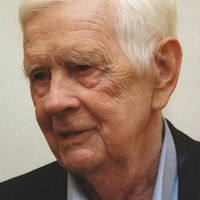Polish historian and theoretician of the puppet theatre, theatre critic, playwright and translator, and university professor. Henryk Jurkowski graduated in Polish Philology from Warsaw University (1951). From 1952 to 1972 he was an officer of the Ministry of Culture, responsible for the puppetry section. He was a professor in the puppetry schools in Poland: in Wroclaw (1973-1981), where he was dean of the Faculty of Puppet Theatre (1975-1978; see Wydział Lalkarski we Wrocławiu), and in Białystok (1980-2006), where he was dean of the Faculty of Puppetry Directors (1980-1984), and pro-rector of the Aleksander Zelwerowicz State Theatre Academy in Warsaw responsible for the Puppetry Art Faculty in Białystok (1990-1994; see Akademia Teatralna w Białymstoku).
Henryk Jurkowski has taught as a guest professor in puppet theatre schools in Charleville-Mézières (France), Sofia (Bulgaria), London (UK), Stuttgart (Germany) and Prague (Czechoslovakia/Czech Republic), and has given numerous lectures in France, Spain, the United Kingdom, Mexico and Russia. In Poland he was also literary adviser for theatres and television programmes for children, sometimes guest director for puppet theatres and for television, and editor-in-chief of the magazine Teatr Lalek (Puppet Theatre) in 1969-1970. Several of his plays for puppets achieved great success: Ludowa szopka polska (Popular Polish Nativity Scene, 1969), Tyrptyk staropolski: Juryta i Holofernes, Syn marnotrawny, Męczeństwo świętej Doroty (The Old Polish Trypticon: Judith and Holofernes, The Prodigal Son, The Martyrdom of Saint Dorothy, 1972).
From 1959 to 1992 Henryk Jurkowski was a member of the Presidium and later of the Executive Committee of the Union Internationale de la Marionnette (UNIMA), and was its general secretary from 1972 to 1980, vice president (1980-1984), then president (1984-1992). In 1992, he was made Honorary President of UNIMA. During his term of office he restructured the organization; he created a publication L’Information de l’UNIMA (Information from UNIMA) and he established specialized commissions. He was co-founder of the Institut International de la Marionnette at Charleville-Mézières.
Author of many books, studies and essays on puppetry published in many languages, his most important works are: Dzieje teatru lalek (The History of Puppet Theatre), vols. 1-3, Warszawa, PIW, 1970-1984; Aspects of Puppet Theatre. A Collection of Essays, London, Puppet Centre Trust, 1988 (consisting of aesthetic and semiotic studies on modern puppetry); Écrivains et marionnettes, quatre siècles de littérature dramatique en Europe (Writers and Puppets, Four Centuries of Dramatic Literature in Europe), Charleville-Mézières, Institut International de la Marionnette, 1991 (the first study dedicated to dramatic literature for puppets); A History of European Puppetry, vols. 1 and 2, Lewiston, The Edwin Mellen Press, 1996 and 1998; Métamorphoses. La Marionnette au XXe siècle (Metamorphoses. The Puppet in the 20th Century), Charleville-Mézières, Institut International de la Marionnette, 2000; second ed. Montpellier, Editions L’Entretemps, Institut International de la Marionnette, 2008; Antologia klasycznych tekstów teatru lalek (Anthology of the Classic Puppet Theatre Plays), vols. 1-3, Wrocław, PWST Wydział Lalkarski, 1999-2003; Aktor w roli demiurga (An Actor in the Role of Demiurge), Warszawa, Akademia Tewatralna im. Aleksandra Zelwerowicza, 2006; Przemiany ikonosfery. Wizualny kontekst sztuki teatru (Changes of the Iconosphere. Visual Context of Theatre Art), Wrocław, Wydawnictwo Uniwersytetu Wrocławskiego, 2009; Materiał jako wehikuł treści rytuału (Material as a Ritual Contents Vehicle), Warszawa, Wydawnictwa Uniwersytetu Warszawskiego, 2011.
Henryk Jurkowski was scientific councillor for ITI’s Encyclopédie mondiale du théâtre contemporain (World Encyclopedia of Contemporary Theatre, 1994-1999), and editor-in-chief from 1994 to 2002 of UNIMA’s Encyclopédie mondiale des arts de la marionnette (World Encyclopedia of Puppetry Arts).
Henryk Jurkowski died in Warsaw on January 3, 2016.
(See Poland.)








